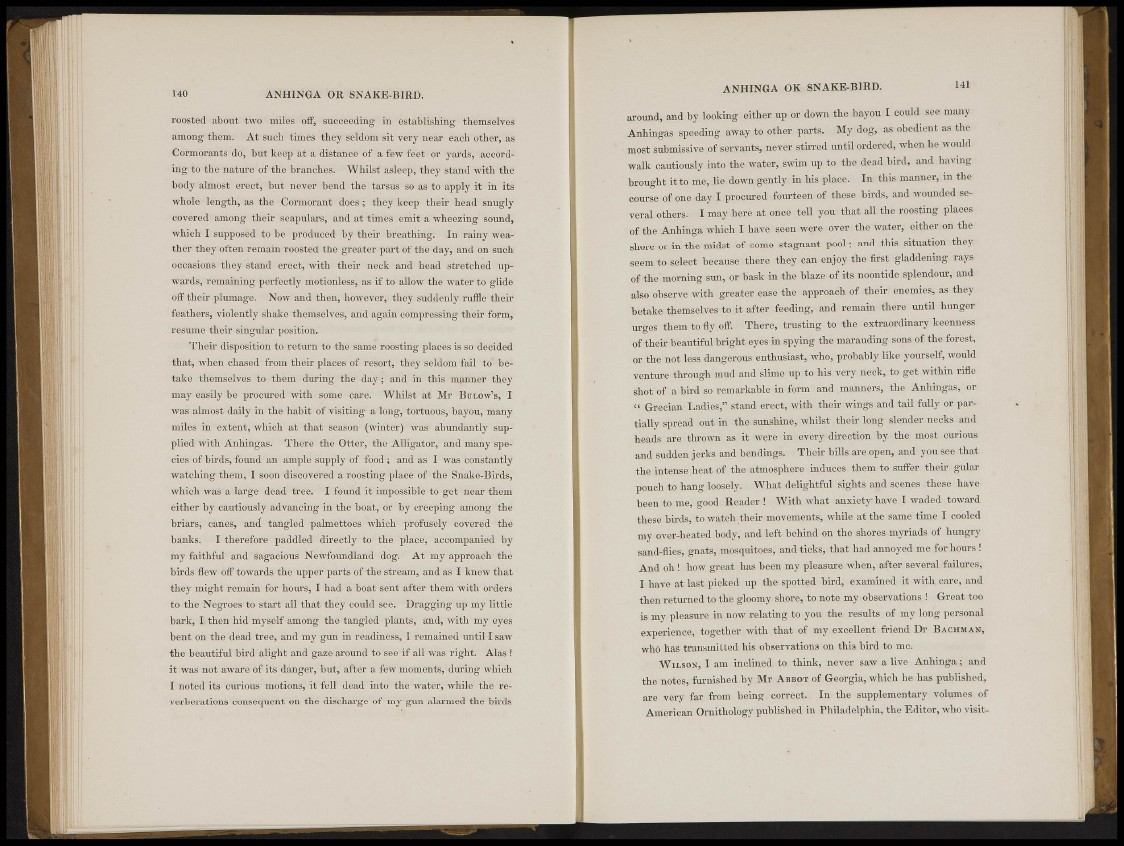
140 A N H I N G A OR SNAKE-BIRD.
roosted about two miles off, succeeding in establishing themselves
among-them. At such times theysMdoni sit very near each other, as
Cormorants do, but keep at' a distance of a few feet or yards, according
fy- the nature of the'brandies. Whilst asleep, the?f stand with the
body almost erect, but never borni the tarsus so as to apply it in its
wholeijihgth, as (lit: "Cormorant docs ; they keep their head snugly
covered among their scapulars, and at times omit a wheezing Jfffijiits'
which01'supposèd to bo produceC^byilJheir breathing. In rainy weather
thin- often remain roosted the greater part of the dayy ¿ml on such
occasions they stand erect, with their 'Tftek and head stretched 'upwards,
remaining perfectly rtotiffiiless, as if to allow the water to glide
off their plumage. Now and then, however, they suddenly ruffle their
usathers, violently shake themselves, and again compressing' their form,
resume their singular positidh?S'.
Their disposition to. rótWfn to the-sanie roosting places is so decided
that, when clia.siil'ff'o'rfwtlfeir places of resort, they scl'dotti fail to betake
themselves to them during the day ; and in tir.* manned they
may easily bè procured with Sè'fiiè caro. Whilst at Mr Butow's, I
Was almost daily in thè habit bf visiting' a long, tortuous, bayou, many
miles in ' extent, wliich at that soìùs'oti (winter) was' abundantly supplied
with Anhingas^ There the Otter, the Alligator, and many species
of birds, found an ampie supply of food ; and as I was constantly
watching them, I soon discovered a roosting place of the Snake-Iìirds,
which was a largo dead tree. I found itdmpossible to get near them
either by Cautiously advancing in the boat, or by creeping amori*i'!thé
briars, canes, aim tangled palmettoes which* profusely covered thè
banks. I therefore paddled directly3 to the place,' accompanied by
my faithful and sagacious Newfoundland dog. At my approach'thè
birds flew off towards the upper parts of the stream, and as I knew that
they might remain for hóùrs, I had a boat sent after them with orders
to the Negroes to start all that they could see. Dragging Up my little
bark, I. then bid m\ self among thè'tangled plants, and, with my eves
bent on the dead tree, and my gun in readiness, 1 remained until I saw
the beautiful bird alight and gaze around tQ-sBft if all was right:" Alas !
it was not aware of its danger,but, after a tew moments, during which
I noted its curious motions, it fell dead into ' the water, while the reverberations
consequent on the discharge of my gun alarmed the birds
A N H I N G A OK SNAKE-BIRD. 141
around, and by-looking either up or down the bayou I could see many
Anbingas sp.iodmg away to other parts. My dog,; as obedient as the
most, submissive of »ervaiits, never stirred until ordered, when he would
walk cautiously into the water, swim up tos the dead bird, and having
brought it to me, lie down gently in his ¡place. In this manner, in the
course of one day I procured fourteen of these birds, and wounded several
others.-. I may.liero at once tell you that all.the roosting places
of the Anhinga which I have sc.cn were over the water,! cither on the
shore or in the midst of some stagnant pool; and "this situation they
seem to select because®h6ie vthey can e$oy the first gladdening rays
aftgfe' morning sun, or bask in the blaze-of its noontide splendour, and
also observe with greater ® « the approach of their enemies, as they
betake themselves to it after feeding, and remain there until hunger
urges them to fly off. after«;, trusting to the extraordinary keenness
of their beautiful bright eyes in spying the marauding sons of the forest,
or the not less dangerous enthusiast, who, probably like yourself, would
vörture throughi'lmid and slim«; up. to his very «eck, to get within rifle
shot of a bird so remarkable in form and manners, the Anhingas, or
" Circfiian»l>»dics," stand erect, with their wings and tail fully or partially
spread out in the;sunshine, whilst their long slender.necks and
heads are thrown as it »were in evovv direction by the most curious
and sudden jerks and bendings. Their bills are open, and you s.ee that
the intense heat of the. atmosphere induces them to suffer their gular
pouch to hang loosely. What delightful sights and scenes .¡these have
been to me, good Reader ! With what anxiety have I waded toward
these birds, to watch their movements, while at the same time I cooled
my overheated body, and left behind on the shores; myriads of hungry
sand-flics, gnats, .mosquitoes, and ticks, that had annoyed me for hours!
And oh! how great has been my pleasure when, after several failures,
I have at last picked up the spotted bird, examined it with, care, and
then returned to the gloomy shore, to note my observations ! Great too
is my pleasure in mow relating to. you the results of my long personal
experience, together with that of my excellent friend l)r BACHMAN,
who has transmitted his observations on this bird to me.
WILSON, I am inclined to think, never saw a live Anhinga; and
the noteSj furnished by Mr ABBOT of Georgia, which he has published,
are very far from being correct. In the supplementary volumes of
American Ornithology published in Philadelphia, the Editor, who visit